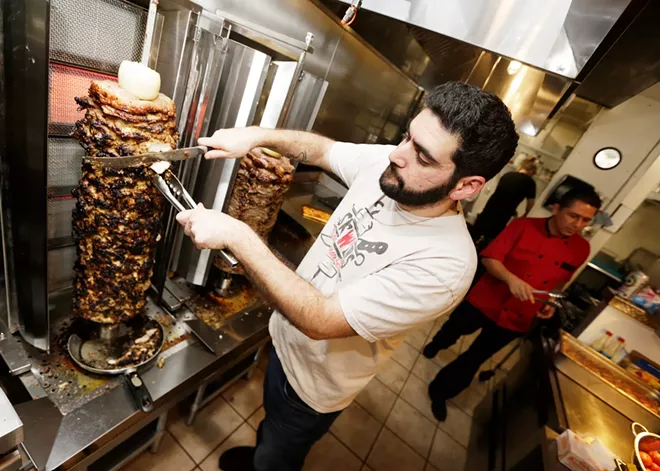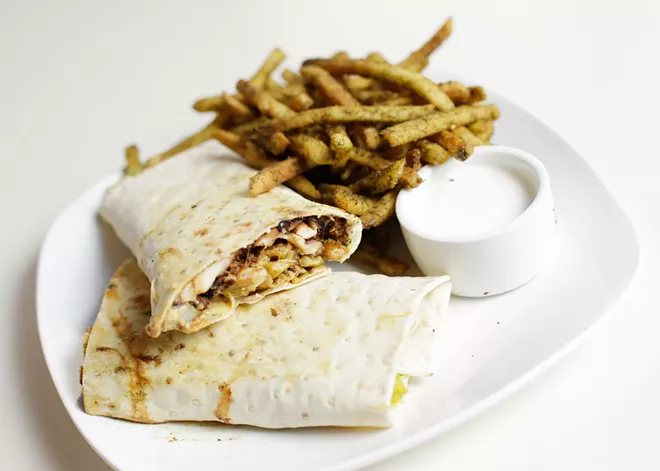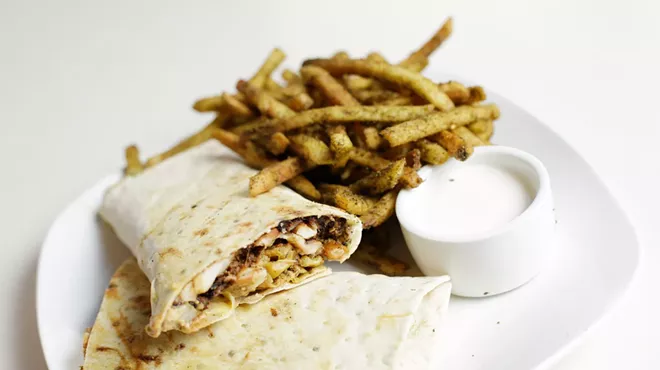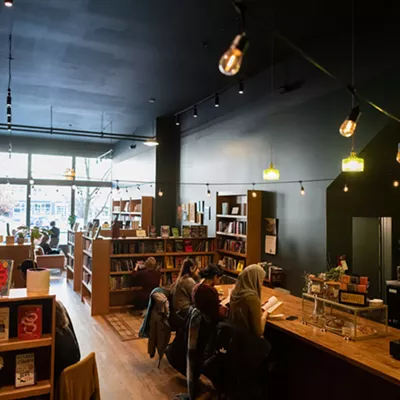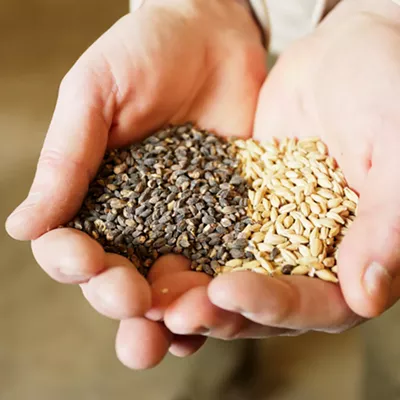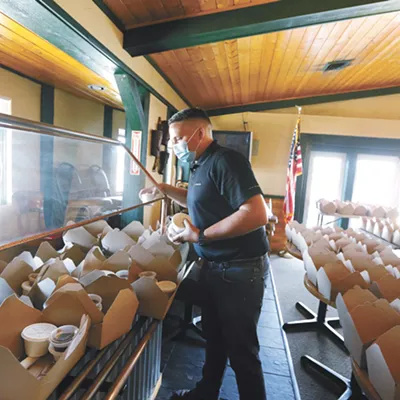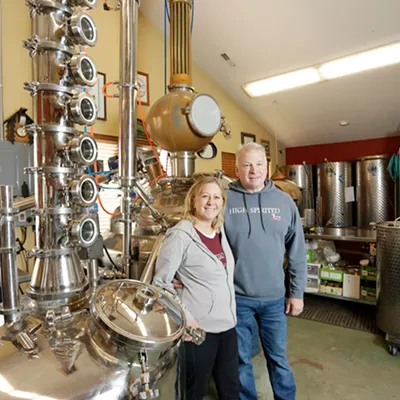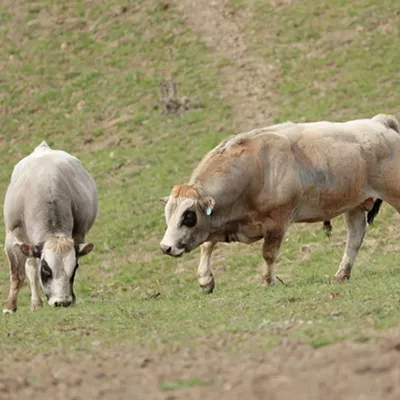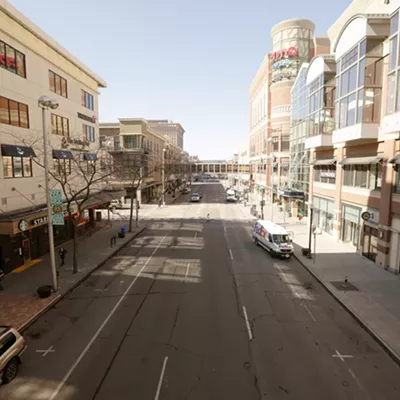He couldn't find any, so he made his own.
Kazanjian's dedication to making, and eating, authentic shawarma is taking him on a wild ride. What started as an experiment to turn a $15 Craigslist barbecue into a functioning rotisserie became a full-blown food truck business. In 2016, Kazanjian called his truck Skewers. In 2022, Skewers was voted the top food truck in Spokane by Inlander readers in our annual Best Of readers poll for bringing Armenian-Lebanese food all over the city and proudly proclaiming #SpokaneHasShawarma wherever it went.
Now, Spokane can have shawarma every day. Skewers is opening a fixed-location restaurant downtown thanks to a dream-come-true partnership with local chef Michael Wiley.
Skewers' new restaurant opens on Friday, Sept. 22, with fast, street-style counter service on West First Avenue where Rain Lounge used to be. On Friday and Saturday nights, stop in for late-night snacks and drinks, both alcoholic and not. Eventually, Kazanjian and Wiley will also offer family-style, sit-down dining experiences in the style of an "agoomp," or gathering place, in the space next door, previously Scratch Restaurant. Plus, Kazanjian still plans to keep the food truck going next season for a full calendar of catering and events.
Kazanjian's food is family history, cultural memory and current affairs all wrapped up in fresh pita. Kazanjian's grandparents escaped the Ottoman empire's genocide of Armenians during World War I. His grandparents, like many others, fled to Lebanon and eventually raised a family there. Kazanjian's parents came to America during the civil war in Lebanon. By featuring both Armenian and Lebanese flavors in his dishes, Kazanjian honors generations of resilience and perseverance.
Now, the permanent restaurant marks new victories on both a local and global scale.
"There's a renewed effort to commit genocide against Armenians," Kazanjian says, referring to revived tensions between Armenia and Azerbaijan in the Nagorno-Karabakh region, also known as Artsakh. "Maintaining the culture, practicing the tradition, maintaining the language is our victory."
At Skewers, every meal served is a celebration of Armenian identity and survival.
Shawarma means "turning" or "rotisserie" in Arabic. In order for shawarma to be shawarma, it must be made on a vertical, spinning rotisserie. Beef, lamb or chicken are sliced thin, marinated, layered onto the vertical skewer and rotated between shimmering panes of heat. Also called "donar" in Turkish or "gyro" in Greek, shawarma is an ancient way of preserving and serving meat.
After Kazanjian mastered real shawarma (wraps $15-$17; platters $15-$21) he could start exploring other familiar street foods. He knew what they tasted like, but it was a whole new kind of education to learn the history of the foods he had taken for granted.
"I did a lot of research to understand really, what was the point of shawarma? What's the point of falafel?" he says. "[I wanted] to understand that and try to respect that and re-create that. It was part of my culture, but the origins of food are not taught in school."
For example, he learned that falafel began as an alternative to shawarma for people celebrating Lent, a season during the church calendar when Christians fast from meat and other luxuries. It was an obvious addition to Kazanjian's menu, not just to serve non-meat eaters, but to offer Spokane authentic falafel made from real beans, not the powders used in most other restaurants.
He makes his falafel ($14 wrap, $12 bites) from both fava beans and chickpeas, since fava beans are more traditionally Lebanese and chickpeas are standard Armenian style. The deep-fried balls are dark on the outside and bright green on the inside (from the fresh herbs), exactly how you'd find them in the Levant.
Hummus bowls ($10), pickled veggies, cucumber-mint or tahini sauces complement each dish with bright, punchy flavors. Wiley, his new business partner, loves the sumac on the Mediterranean fries ($7), a tangy red spice that cuts through the hot potatoes. Some might be surprised by the burst of flavor. But from the start, Kazanjian had little interest in toning down traditional flavors for an American audience.
"I think part of the struggle was my refusal to compromise," he says. "I still get comments that are perceived as negative reviews, like 'Your food has too much flavor. It's too much. You're using too many spices.' I usually thank them for being adventurous and trying something they hadn't before. And I say, it's not for everybody, and that's OK."
Kazanjian has learned that food is an education, both of palate and mind. He doesn't mind that people have different levels of curiosity. Instead, he thinks about his Egyptian neighbor who cried for joy and homesickness when he tasted Kazanjian's food. By being honest about his own learning journey, Kazanjian invites anyone to explore culinary and political histories with new flavors, new dishes and new neighbors.
Even though Kazanjian built a winning menu and a loyal following with his food truck, he had few aspirations to open a permanent spot. Banks don't lend to new restaurateurs very easily, and instead of saving up, Kazanjian was sending all his extra profits to Armenia in support of humanitarian aid work there.
Michael Wiley, on the other hand, coincidentally found himself with an empty, expensive building and a fully functional kitchen but no one to operate it.
Wiley had just started renting and renovating Scratch Restaurant and Rain Lounge, in addition to operating his more mature businesses, Wiley's Bistro and Prohibition Gastropub. Issues with a vent hood at the bistro suddenly forced it to move locations, and Wiley had to spend the money reserved for the new venture to save the old one. He needed to let Scratch and Rain go to let the other restaurants stay afloat.
But the universe had a different idea, he says.
On his way out of Rain Lounge, after he had just told his landlord Jerry Dicker that he was out, Wiley ran into his old friend Angela Schutz, a local PR manager with lots of friends in the restaurant industry. As Wiley explained what was happening, Schutz had an idea. She introduced Wiley to Kazanjian, and the rest is history.
Well, almost.
"In the beginning, I was like, 'Are we going to get to an agreement? Because you're both looking out for each other so much," Schutz says.
The mutual respect and consideration was overwhelming.
"It's one of the ways that I knew this wasn't just a business move," Wiley says. "This is a spiritual move."
Together, Kazanjian and Wiley are the perfect hosts — warm and hospitable, masters of great food. But this space is especially unique. At Skewers, Armenians can gather to celebrate their culture, which flies in the face of the darkness their people face.
Suddenly, Armenians living in different pockets are finding a community they didn't know existed in the Inland Northwest. Families are sitting down to the traditions of their ancestors. The Armenian flag in Skewers' new window lets the whole city know that they are here and they are thriving.
It's a paradox that Kazanjian doesn't take lightly.
"There's a genocide going on and it's like, 'How can I be excited and happy about this or have Armenians gathering here and acting like we're happy?'" Kazanjian says. "It's weird to be celebrating something when there's a genocide going on. But that celebration is part of their survival." ♦
Skewers • 1007 W. First Ave. • Open Wed-Thu 4-9 pm; Fri-Sat 4 pm-midnight; Sun 4-9 pm • skewerstruck.com • 509-456-5656

